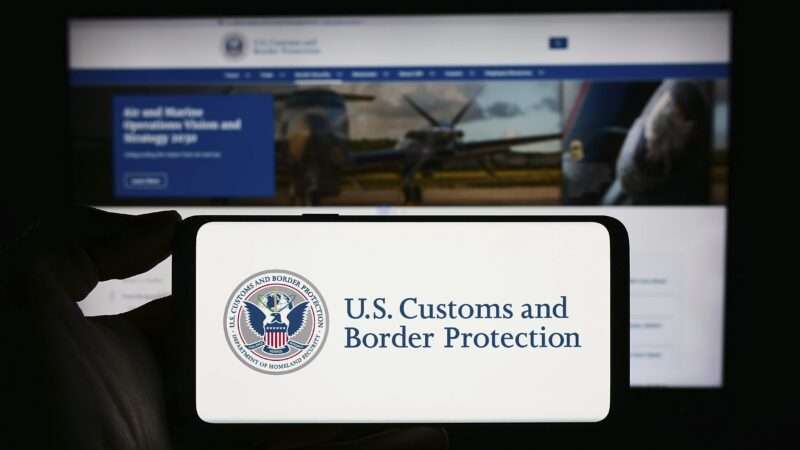
The Fourth Amendment still applies at the border, despite the feds' insistence that it doesn't.
For years, courts have ruled that the government has the right to conduct routine, warrantless searches for contraband at the border. Customs and Border Protection (CBP) has taken advantage of that loophole in the Fourth Amendment's protection against unreasonable searches and seizures to force travelers to hand over data from their phones and laptops.
But on Wednesday, Judge Nina Morrison in the Eastern District of New York ruled that cellphone searches are a "nonroutine" search, more akin to a strip search than scanning a suitcase or passing a traveler through a metal detector.
Although the interests of stopping contraband are "undoubtedly served when the government searches the luggage or pockets of a person crossing the border carrying objects that can only be introduced to this country by being physically moved across its borders, the extent to which those interests are served when the government searches data stored on a person's cell phone is far less clear," the judge declared.
Morrison noted that "reviewing the information in a person's cell phone is the best approximation government officials have for mindreading," so searching through cellphone data has an even heavier privacy impact than rummaging through physical possessions. Therefore, the court ruled, a cellphone search at the border requires both probable cause and a warrant. Morrison did not distinguish between scanning a phone's contents with special software and manually flipping through it.
And in a victory for journalists, the judge specifically acknowledged the First Amendment implications of cellphone searches too. She cited reporting by The Intercept and VICE about CPB searching journalists' cellphones "based on these journalists' ongoing coverage of politically sensitive issues" and warned that those phone searches could put confidential sources at risk.
Wednesday's ruling adds to a stream of cases restricting the feds' ability to search travelers' electronics. The 4th and 9th Circuits, which cover the mid-Atlantic and Western states, have ruled that border police need at least "reasonable suspicion" of a crime to search cellphones. Last year, a judge in the Southern District of New York also ruled that the government "may not copy and search an American citizen's cell phone at the border without a warrant absent exigent circumstances."
Wednesday's ruling involves defending the rights of an unsympathetic character. U.S. citizen Kurbonali Sultanov allegedly downloaded a sketchy Russian porn trove, including several images of child sex abuse, which landed him on a government watch list. When Sultanov was on the way back from visiting his family in Uzbekistan, agents from the Department of Homeland Security pulled him aside at the airport and searched his phone, finding the images.
Morrison suppressed the evidence from the phone search but not Sultanov's "spontaneous" statement admitting to downloading the videos. And her order would not have prevented the police from getting Sultanov's phone the old-fashioned way. Sultanov had allegedly downloaded the porn while in the United States, and his name popped up on the watch list two months before his return flight. And, in fact, the feds did obtain a court order to search Sultanov's spare phone.
The Southern District of New York ruling last year also involved an unsympathetic character. Jatiek Smith, a member of the Bloods gang, was being investigated for a "violent and extortionate takeover" of New York's fire mitigation industry. When Smith flew home from a vacation in Jamaica, the FBI took advantage of the opportunity to search Smith's phone at the border.
A judge suppressed the evidence from the phone search, but Smith was convicted anyway. In both cases, the feds could have gotten a warrant for the suspects' phones; they saw the border loophole as a way to skip that step.
In fact, CBP Officer Marves Pichardo admitted that these searches are often warrantless fishing expeditions. CBP searches U.S. citizen's phones if they're coming from "countries that have political difficulties at this point in time and that we're currently looking at for intelligence and stuff like that," Pichardo testified during an evidence suppression hearing. He asserted that CBP agents can "look at pretty much anything that's stored on the phone" and that passengers are usually "very compliant."
Because of the powers the government was claiming, civil libertarians intervened in the Sultanov case. The Knight First Amendment Institute at Columbia University and the Reporters Committee for Freedom of the Press filed an amicus brief in October 2023 arguing that warrantless phone searches are a "grave threat to the Fourth Amendment right to privacy as well as the First Amendment freedoms of the press, speech, and association." Morrison heavily cited that brief in her ruling.
"As the court recognized, letting border agents freely rifle through journalists' work product and communications whenever they cross the border would pose an intolerable risk to press freedom," Grayson Clary, staff attorney at the Reporters Committee for Freedom of the Press, said in a statement sent to reporters. "This thorough opinion provides powerful guidance for other courts grappling with this issue, and makes clear that the Constitution would require a warrant before searching a reporter's electronic devices."
The post Courts Close the Loophole Letting the Feds Search Your Phone at the Border appeared first on Reason.com.







